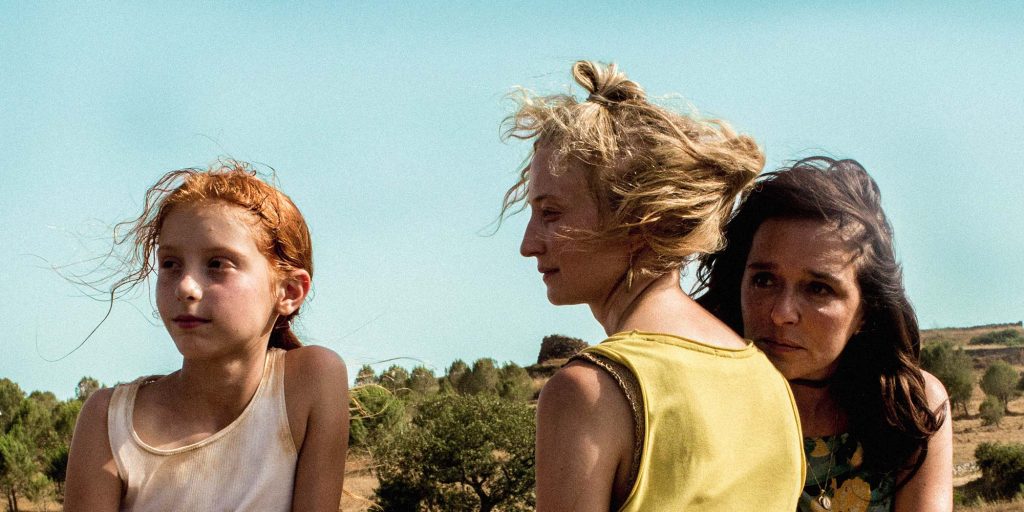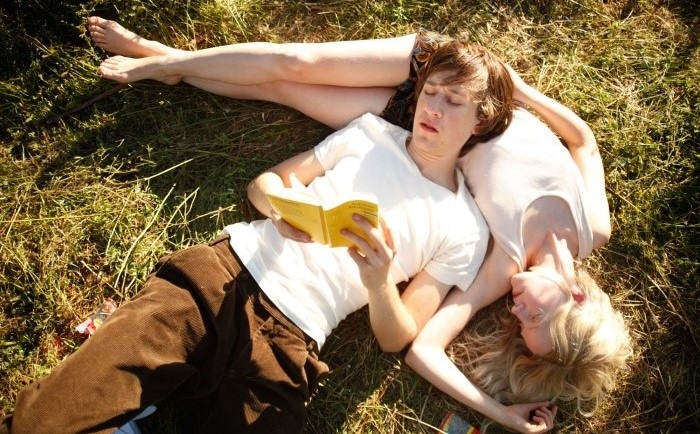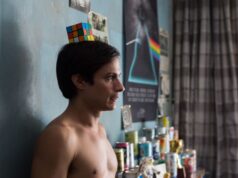Final-day coverage of the 68th Berlin International Film Festival with reviews of Daughter of Mine, Mug, Transit, The Heiresses, and My Brother’s Name Is Robert and He Is an Idiot
Daughter of Mine (Figlia Mia)
Vittoria (Sara Casu) is a red-haired nine-year-old girl growing up with her adoptive parents in a remote village in Sardinia. Her foster mother Tina (Valeria Golino) has been in contact with the girl’s alcoholic birth mother Angelica (Alba Rohrwacher) for a long time, visiting her often at the woman’s rundown farm where she lives with her horses and a dog. Now that Angelica is facing eviction after having accumulated an enormous debt, she has decided to vacate her farm in one month and move to the Italian mainland. But when she asks Tina to take Vittoria to see her, the girl’s curiosity brings Angelica closer to her daughter than Tina would want.
Focusing primarily on the story she wants to tell, Laura Bispuri directs Daughter of Mine with an essentially naturalistic, matter-of-fact approach, using a grainier image, elongated shots and a handheld camera. The film also relies on strong performances, and while Casu plays Vittoria as a typically curious girl who becomes fascinated with Angelica’s high spirits, Golino conveys all the love and affection that Tina has for the girl, making us understand her fear that she may be like her birth mother (a resemblance emphasized by their hair color) — which lets us forgive her desperate attempt to “cure” her daughter and expose what a “whore” Angelica is.
But it is Rohrwacher who stands out here, proving again she is a perfect actress to embody unstable characters like the one she played in Hungry Hearts (2014). Impetuous and volatile, Angelica is quick to kick her dog and daughter away after losing her temper — only to be full of love towards them when they come back, as if nothing happened — and it’s a testimony to Rohrwacher’s talent how Angelica gains our sympathy and pity even as she risks Vittoria’s life on a greedy whim and erratically blames her for her own problems.
Still, despite the great performances, Daughter of Mine reaches a frustrating climax when Tina inexplicably figures out that Vittoria is in danger (including where she is), and the ending feels more like a silly cop-out than a proper resolution for the conflict between the two mothers. And that is such a shame considering all the effort and talent involved up to this point.
Mug (Twarz)
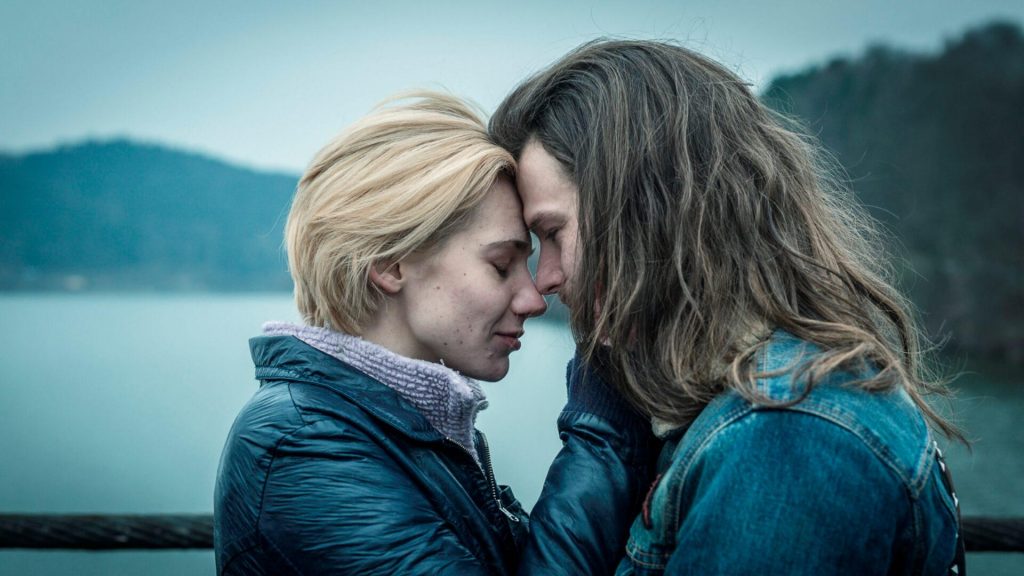
Like Małgorzata Szumowska’s In the Name of (2013), the plot of Mug is simple: Jacek (Mateusz Kościukiewicz) is a long-haired, bearded and handsome young man who loves heavy metal and his girlfriend Dagmara (Malgorzata Gorol). Working his muscles on a construction site where the world’s largest statue of Jesus is being built, he lives an easygoing, carefree life in a mainly conservative community. But a horrible accident at work radically changes everything when his face is left completely disfigured and he becomes the first person in Poland to have a face transplant, which forces him through a deep existential crisis.
The film’s intentions can be grasped right in the first scene, when we are informed by a title card that this story takes place in “NOWHERE” and we witness a fiery mob of half-naked people battling one another like bloodthirsty animals in an underwear stampede sale at a department store. Likewise, Jacek’s family is depicted as a group of disagreeable people who are constantly at one another’s throats, while his workmates also fight all the time. It’s clear that Szumowska wants to paint a very negative picture of the inhabitants of this place as a bunch of racist and sexist Christians who casually make offensive jokes about Muslims and gypsies.
But the problem is that, by somehow referencing Franz Kafka’s The Metamorphosis, especially with a family dinner where Jacek’s entire family looks repelled by the way he eats after the accident, Mug doesn’t leave much room for nuance. This is made worse by Dagmara proving to be such a selfish, shallow person, and by a despicable priest who steals the money of donations and wants to hear the spicy details of other people’s sexual lives — although, on the other hand, the construction of the statue is a delightful irony, and prejudice is cleverly shown to matter only when it hits home.
Stumbling also in the way it directs our eyes to selectively focused areas on screen by diffusing the image along the edges (I can see that Szumowska wants to mimic Jacek’s vision of a deformed world but she employs that even before the accident), Mug at least makes us feel the character’s sorrow by contrasting it with dream scenes and bright moments from his past with Dagmara — and that compensates for the film never managing to be memorable.
Transit
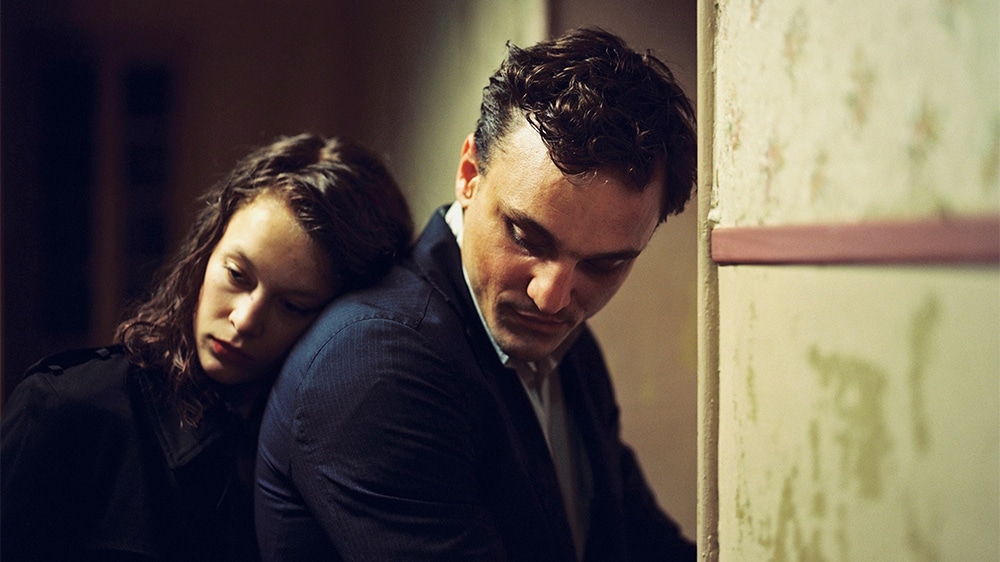
Transit feels like something Graham Greene would have written if he were still alive and living in an alternate reality where France had just been invaded by the Germans. Based on a novel by Anna Seghers (which I’ve never read), Christian Petzold’s adaptation transposes the original story written in 1942 to the 21th century and creates a clever film that curiously doesn’t feel anachronous now that far-right movements are growing everywhere in Europe. The result, in the best tradition of Greene’s works (and The Quiet American quickly comes to my mind), is an entertaining character study and a smart political commentary as well.
Like a novel written in first person, we hear a narration that is not limited to telling us what the protagonist is feeling but even anticipates events that are to come and lets us see between the lines of his actions. The character, Georg (Franz Rogowski), is a political refugee who is asked by a friend to deliver a letter to a writer in Paris. Upon finding out the man is dead, he assumes his identity and flees to Marseille, where he begins a torrid affair with the writer’s widow Marie (Paula Beer) — who is ignorant of her husband’s fate and waits for him. As the political situation worsens, Georg considers the possibility of leaving Europe with her in the man’s place.
Quiet and pensive, Georg rarely shares his intentions and motivations with those around him, and we usually see him hiding information or trying to appear to be something he is not in order to protect his identity — and consequently his life. It is interesting to notice, for instance, that he stays at a hotel even though he knows that the woman who runs the place will sooner or later denounce him to the authorities — and for that matter, the casting of an actor like Rogowski is more than perfect, since he is always great playing taciturn characters who keep to themselves (just check out his performance in In the Aisles, also at the Berlinale competition).
But not only compelling as a well-acted character study, Transit is an intelligent commentary as well, which can be seen when European refugees tell us their life stories. Petzold makes a clear parallel with our increasingly xenophobic times and plays with anachronisms by showing us modern cars, characters wearing vintage clothes and an office decorated like in the 1940s with an old telephone. And to make it better, the film is quite tense too.
The Heiresses (Las Herederas)
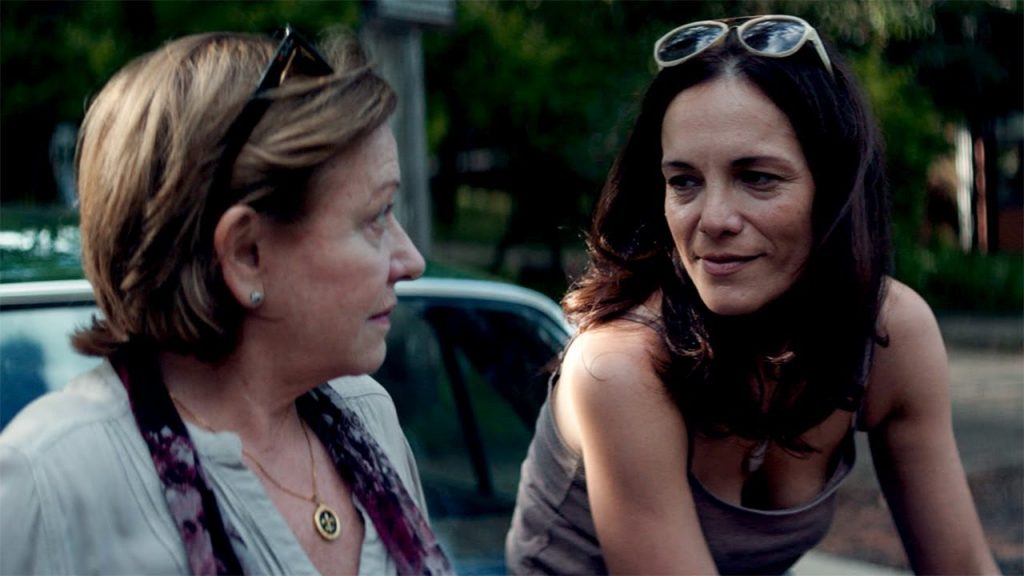
One of the favorite films among critics at the Berlinale this year is the debut of Paraguayan director Marcelo Martinessi, The Heiresses. Owing to the works of Lucrecia Martel — especially The Headless Woman (2008) — this is not just a perceptive example of character study but a film that probes into matters like social class and the lingering privileges of a decadent Paraguayan elite that feels more like a remnant of colonial times. The characters we follow — the heiresses of the title — are women who descend from wealthy families in the country — one of whom finds herself forced to rethink her life after being confronted with a new reality.
Chela (Ana Brun) has been a couple with Chiquita (Margarita Irun) for over 30 years. They have never had to work in their lives and now face financial difficulties that force them to sell part of their inherited furniture. But things get worse when Chiquita is arrested for fraud and Chela is left on her own, afraid of social exposure and rejecting help from friends. When she begins to provide an informal taxi service to rich older ladies from the neighborhood, driving for the first time in years, Chela meets the much younger Angy (Ana Ivanova), and a close connection starts to grow between the two women, leading Chela to rediscover herself away from Chiquita.
After spending an entire life pampered by those around her, Chela is used to a routine she has never questioned. Before going to prison, Chiquita puts a maid in charge of bringing Chela her daily assortment of Diet Coke with ice, glass of water without ice, tea, coffee and pills — and even the disposition of those elements on a platter must be strictly respected. The film is clever to let us participate in Chela’s fastidious existence so we can understand how lost she feels after losing everything she has (Chiquita and her goods), as well as the contrast that arises from the idiosyncrasies of the old ladies she begins to drive up and down.
As Chela is exposed to a world she has always kept away from, the effect is overwhelming, and this is emphasized by the film’s superb use of loud sounds that violently invade our senses, like noisy cars on the road. Brun perfectly embraces the character’s confusion and gradual change, letting us grasp, for instance, what it means for Chela to hear someone call her “poupée” like in the past. And when she breaks everything on a platter, we see where this journey has taken her.
In the end, The Heiresses not only benefits from a tremendous leading performance but is also one of the few films at the festival this year that knows exactly how to end.
My Brother’s Name Is Robert and He Is an Idiot (Mein Bruder heißt Robert und ist ein Idiot)
The last film I saw at the 68th Berlinale was the daring My Brother’s Name Is Robert and He Is an Idiot, which made me realize I would soon be seeing half of the audience abandoning the theater and complaining that watching paint dry is a lot more exciting. “The sense of being is time,” the character of Robert (Josef Mattes, Silent Youth) declaims to his twin sister Elena (Julia Zange) as they spend a summer day together in the midst of cornfields near a country gas station and he helps her prepare for her final philosophy exam. “The basis of time is hope,” he then completes, giving away the very purpose of the film as well.
Elena says Robert is dumb and an idiot, but he seems more like a natural-born philosopher to whom thoughts come easy, making no effort to come up with endless Heideggerian aphorisms. Sometimes, she looks like a disciple listening to his philosophical and existential digressions, always patiently ready for his next flash of wisdom. With 48 hours to the exam and a lot of time in their hands, Elena challenges Robert to a bet that involves her sleeping with anyone before graduating. If she loses, he gets her car; if he wins, he gets to have anything from her that is not an object. Their love-hate relationship is both warm and aggressive.
Director and co-writer Philip Gröning is patient as well and takes his time, almost challenging us to watch these two siblings as they basically spend their whole time doing nothing. Thinking is waiting, and so we are made conscious of our own expectation for something — anything — to simply happen. According to Robert, animals cannot wait, but we as humans are supposed to, so that “truth” will reveal itself in the end. This is the fundament upon which the film’s thesis rests, if we assume that there is truth to be revealed at all. As Robert points out, this is about waiting, not wanting. It’s the difference between hope and expectation.
In other words, wanting is useless, and the only way to see the film’s point is to wait. For a long time, however, we are left with the stillness of the plot — or lack thereof. It seems Gröning is looking for a precise moment when we will feel that time literally stopped, or dilated. For those who don’t have the patience for this sort of narrative experiment, it may prove excruciating for nearly three hours of duration, but if you let yourself be taken by the hand, it can be fascinating, almost metaphysical. And for that matter, your response to the film’s conclusion will be directly determined by what kind of expectations you held up to that point.
Gröning presents his philosophical thesis in a way that seems distinctly prosaic and matter-of-fact, sometimes using grainy footage and often bringing our attention to the mundane details on screen, like Robert’s hands, or the ants, bees, and other insects surrounding the characters. But he also introduces a few surreal elements here and there, not only in the shape of strange objects (such as a pyramidal wristwatch) but with characters too who appear and disappear like in a dream, disrupting the apparent naturalism of what we see — something that the gorgeous cinematography occasionally complements with overexposed images.
And yet the driving force in all this is the two central leads, who carry the film on their shoulders and have a magnetic chemistry together. Hope is future modality; otherness is the price of hope, as Robert says. Those in the audience expecting a surprise are likely to be frustrated by a catharsis that is purposely inconsequential. Perhaps that is the point after all: the ending to be a reward to those who were able to remain in the present (and a mock to those who expected).
It’s not because the film ends with a bang that anything that happens must mean something. Perhaps what we see should be better taken as isolated notes in a song.


